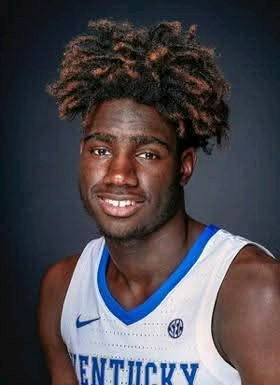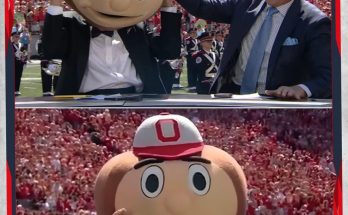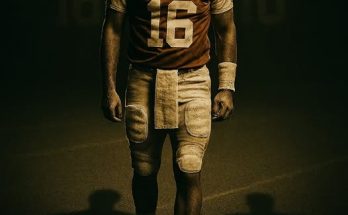When Kahlil Whitney first stepped onto the hardwood at Rupp Arena, the expectations were immense. A McDonald’s All-American and one of the highest-rated recruits in Kentucky’s 2019 class, Whitney arrived in Lexington with hype, athleticism, and an aura of stardom. But what unfolded was one of the most curious and quietest chapters in recent Wildcat history—a short, turbulent stint that ended in a mid-season departure and left more questions than answers. Now, years later, Whitney has broken his silence, offering raw honesty and a “truth bomb” that peels back the layers of what really happened during his time at Kentucky.
In a candid interview released this week, Whitney laid bare the emotional and psychological weight of being a blue-chip prospect in a program like Kentucky’s—where the spotlight never dims and the pressure to perform is relentless. “I felt like I was drowning,” Whitney said. “It wasn’t just about basketball. It was everything. The expectations, the pressure, the system… I just wasn’t ready mentally for what that world was going to be like.”
His words are as striking as they are refreshing. For a player whose college career lasted only 18 games, with modest stats and limited minutes, many had moved on from his story. But Whitney’s reflection demands attention, because it exposes the other side of the Kentucky machine: the reality that not every five-star thrives, not every blue-blood experience is a fairytale, and that the cost of pressure can sometimes be invisible.
Whitney’s time in Lexington started with fanfare. Coming out of Roselle Catholic High School in New Jersey, he was considered one of the most explosive wings in the nation. His highlights were a reel of thunderous dunks, fastbreak finishes, and defensive flashes. He had the look of a future NBA wing—a 6’7” athlete with a 7-foot wingspan and a motor that seemed built for John Calipari’s system. Kentucky fans welcomed him as a potential star in the making, a player who could anchor the wing and help carry the program to a deep NCAA Tournament run.
But from the season opener, things felt off. Whitney struggled to find rhythm in Calipari’s complex system. His minutes fluctuated. His confidence waned. On a team filled with other high-level talents like Tyrese Maxey, Immanuel Quickley, and Ashton Hagans, Whitney found himself on the outside looking in. He averaged just 3.3 points per game and played fewer than 13 minutes per contest. The once-touted “next big thing” became an afterthought in the rotation.
“I felt like I couldn’t breathe,” Whitney confessed. “People think it’s all glory playing at Kentucky. And yeah, it’s a blessing. But it’s also the hardest thing I’ve ever done. You’re under a microscope every single day. One bad game, one mistake, and suddenly your name is everywhere in the wrong way.”
In January 2020, after just half a season, Whitney made the stunning decision to leave the program. At the time, the move drew a mix of confusion and criticism. The official statement from both sides was respectful, but vague. Whitney declared for the NBA Draft soon after, and though he went undrafted, he managed to land a G-League opportunity and continue working on his game.
Now, with time and distance behind him, Whitney has returned to his Kentucky experience with fresh perspective—not bitterness, but clarity. “I’m not here to blame anyone,” he said. “I just wasn’t ready for that stage. I thought I was. I thought I could walk into Kentucky and dominate. But it’s more than talent. It’s mental toughness, maturity, knowing who you are and what you can handle.”
What Whitney describes is something rarely acknowledged in college basketball, especially in elite programs: the toll of being “the next one.” The system is designed for competition. Coaches recruit the best of the best, pit them against each other in practice, and push them to adapt or be left behind. For players who thrive, the rewards are immense—NBA lottery picks, endorsement deals, national fame. But for those who falter, the fall can be steep and lonely.
Whitney’s honesty opens up a necessary dialogue. He isn’t the first highly touted player to struggle at Kentucky, and he won’t be the last. For every John Wall or Anthony Davis, there are others who didn’t fit the system or didn’t find their footing in time. The program’s structure, designed to maximize talent quickly, doesn’t always allow for the patience some players need. “If you’re not producing, the clock starts ticking,” Whitney said. “And that gets into your head. You start questioning everything—your talent, your decisions, your future.”
Still, he makes it clear that he doesn’t regret the decision to play for Kentucky. “No, never that,” he said. “I’m proud I went there. I learned more about myself in those few months than I ever did before. I grew up real fast. And I still have love for the fans and for the program. But I want people to understand that everyone’s journey is different. Not everyone peaks at the same time.”
Whitney’s words have already struck a chord with fans, many of whom now view his departure with more empathy than confusion. In an era where mental health and emotional well-being are gaining long-overdue attention, Whitney’s willingness to speak up matters. It humanizes the process and reminds people that behind the rankings and recruiting battles are young men trying to figure themselves out in front of millions.
One of the most revealing moments in his interview came when Whitney was asked what he would say to younger players considering a high-profile program like Kentucky. His answer was measured but powerful. “Do your homework,” he said. “Know who you are before you go. Understand that it’s not going to be easy. Be ready to compete, but also be ready to struggle. And don’t be afraid to speak up if you’re not okay. Talk to someone. Don’t hold it in like I did.”
That level of self-awareness, from a player who entered college with NBA dreams and had to recalibrate his entire trajectory, is striking. Whitney now plays with a chip on his shoulder, not from resentment, but from hunger. He wants to prove he’s still the player people once believed in—and more importantly, that he’s grown into a man who can handle the spotlight and the shadows that come with it.
As for Kentucky, the program continues to evolve. Calipari has recently shifted his recruiting philosophy, aiming for a more balanced roster with experienced players and fewer one-and-dones. Whitney’s story, whether directly or not, likely played some role in that reassessment. Coaches are more aware now of the psychological side of development, and schools are investing in mental health resources and support systems that weren’t always in place.
But Whitney isn’t looking for sympathy. He’s looking for redemption. “I’m still here,” he said. “I’m still grinding. I’m still chasing the dream. Kentucky was part of my journey. It didn’t go the way I thought it would, but I don’t run from that. I use it. I learned from it. And I’m better for it.”
In a sports world that often celebrates only the finish line, Kahlil Whitney has given us something more valuable: an honest look at the race itself—the stumbles, the lessons, the growth. His time at Kentucky may have been brief, but his story resonates deeply now, because it’s real.
And in breaking his silence, he’s done more than tell his truth. He’s lifted the curtain on what it means to be a young athlete in the spotlight. He’s turned a once-forgotten chapter into a powerful message. And most of all, he’s shown that sometimes, the most important victories come not in points scored or banners raised, but in the courage it takes to speak your truth and keep going.



